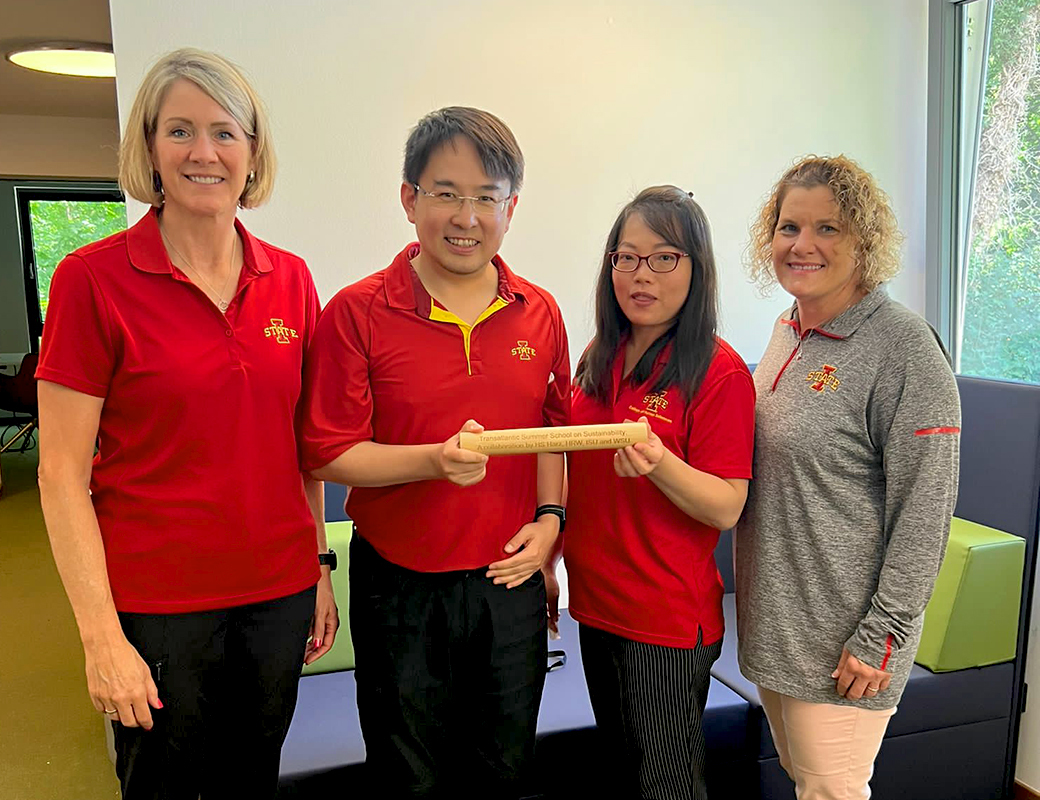Getting good miles from a Fulbright experience
Author: Anne Krapfl
This is an archived story. The content, links and information may have changed since the publication date.
Author: Anne Krapfl

(l-r) Associate provost Ann Marie VanDerZanden; associate professors Ken Tsai and Joan Su, apparel, events and hospitality management; and University Honors administrative director Laurie Law received the baton Aug. 1 in Wernigerode, Germany, as the host university for the 2024 Transatlantic Summer School on Sustainability. Submitted photo.
On Ken Tsai and Ching-Hui (Joan) Su's "cool things I gotta do this year" list is to develop the content for a second annual international and interdisciplinary summer school next May. The two associate professors are leaders in the apparel, events and hospitality management department's event management program: He's the director and she's director of graduate education. With research interests in the broad umbrella of sustainability, they were Iowa State faculty representatives at the first Transatlantic Summer School on Sustainability completed in early August at Harz University of Applied Sciences, Wernigerode, Germany.
Fulbright Day is Sept. 27 on central campus.
The three-credit course considered "the future of energy" and was guided by the United Nations' Sustainable Development Goals. It involved faculty (7) and students (36) in numerous academic disciplines from four universities: Harz, Iowa State, Wayne State University, Detroit; and Ruhr West University of Applied Sciences, Mülheim, Germany. Preceding those two weeks at Harz was a four-week virtual school, where faculty shared the dozen or so curriculum modules and the students warmed up to each other and observed another's world perspective ahead of their in-person session.
If it sounds cookie-cutter neat and easy, it wasn't. The seed was planted in the fall of 2019 when associate provost for academic programs Ann Marie VanDerZanden participated in a two-week Fulbright program for higher education administrators on leveraging technology to expand opportunities in college education. By the end of their program, VanDerZanden and three other participants recognized their schools shared an interest in getting students involved in international study or travel abroad experiences that differed from the more traditional semester or summer abroad.
The University Honors program also has capitalized on Iowa State's relationships in the transatlantic foursome. Last fall, administrative director Laurie Law developed an honors seminar on Blue Science, which promotes socially and ecologically responsible science, and included virtual sessions and team projects with a similar class at Ruhr West University of Applied Sciences. When the seminar is offered again next fall, it will include a back-to-back weeklong travel option. Each school would send students to the other's campus to work on class projects.
When the COVID-19 pandemic removed international travel from the playbook, they pivoted to identify faculty duos across the Atlantic who taught similar courses (in any discipline) and could jointly teach a portion of them, including synchronous class sessions and student team assignments.
Faculty planning trips in fall 2021 (Ames and Detroit) and spring 2022 (Mulheim) focused on building relationships and laying out a structure that could support longer-term objectives for both the student experience and faculty growth. The rotating-location summer school with a sustainability focus across the disciplines bubbled up from those conversations, said VanDerZanden.
Tsai said the benefits of the summer school to students are many: cultural exposure, an interdisciplinary approach to an important and evolving topic, opportunities to learn from other faculty and another country's teaching methods, and a short, lower-commitment study abroad experience. The five Iowa State students received a $1,500 scholarship from Iowa State's Carl and Ruth Hamilton Endowment for Educational Excellence to help with the additional travel and living expenses.
VanDerZanden agreed that students will reap different rewards.
"For some, the interdisciplinary piece may be most valuable. For others who haven't traveled as much, that international exposure might be the most important," she said.
A short trip abroad sometimes leads to a decision to study abroad for a semester or a year, she added.
Su said an attractive aspect of the summer school for her is the opportunity to collaborate with faculty across the globe, not only on the curriculum at hand, but to talk about their research and find common interests. The transatlantic partnership also presents opportunities to recruit graduate students to the event management program -- or other master's programs Iowa State offers. And, after three years she said she thinks they've developed a program that could be replicated.
"The summer school project now is a model we can adapt for other universities in other countries," she said. "I have no doubt we will get benefits from this summer school."
As for their summer school assignment, Tsai and Su said they're considering food sustainability, including production and distribution, as a possible theme for the 2024 edition. Iowa State will host the in-person portion for two weeks in early August; four weeks of online modules are scheduled to begin around the third week in May. Summer school locations are set through 2027.
VanDerZanden said a consortium agreement is in place among the four universities to make it as easy as possible for their faculty to create more inter-institutional projects and programs. And Fulbright administrators are aware of what evolved out of the two-week workshop in fall 2019.
"That's very much the spirit of Fulbright," she said. "They provide the platform, faculty and students make those connections at institutions and can pursue the opportunities that emerge. You never know where they might lead -- whether it's ongoing research collaborations or student internships."